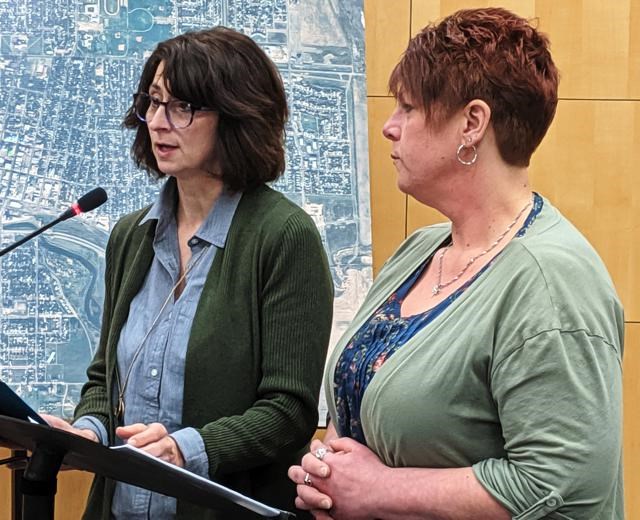Representatives of Envision Counselling asked Weyburn city council if they might be a partner with them in helping to top up their funding for their programs and services in southeast Saskatchewan.
Executive director Christa Daku and Tanis Andrist, resource development coordinator, spoke to council on Monday evening, and pointed out that of all the centres they serve, Weyburn has the highest demand for services in the southeast.
Asked how much of a caseload they have from Weyburn, Daku said there are currently 76 clients, which is an “all-time high”, including those who are dealing with sexual assault, domestic violence and other issues.
They are also seeing an “all-time high” number of residents taking in their family support programs, she added.
“What we’re seeing is a real influx of mental health issues,” she said, adding they have developed a collaboration with the Salvation Army for a walk-in clinic for counselling two days a week, on Tuesdays and Fridays from 10 a.m. to 4 p.m.
Asked if Envision receives government funding, Daku said they do, but it just covers the staff salaries. The funding had been frozen for three years, but now they have received a small increase.
“A lot of that funding goes to salaries. There are shortfalls for mileage and for IT support, and those are growing expenses,” said Daku.
They have been paying visits to other councils in the Rural Municipalities and towns in the southeast to talk about what they’re doing and how they’re helping people out, and to help them understand what programs are available.
“Part of our visits is to share our successes and what’s happening with our organization, so you can help spread the word about our programs,” said Daku.
Of the walk-in counselling service at the Salvation Army, she said, “The beauty of this program is there’s no mandate. It’s for anybody, so we can point them to whatever resources they need the most.”
In answer to a question about what other municipalities they have presented to, Daku noted they have partnerships with some 20 RMs in the southeast, with commitments ranging from $500 or $1,000 a year from many of the.
“We’re just here asking that Weyburn will join us in a partnership,” she said.
Coun. Dick Michel said they are working through their 2020 budget process, and they will consider the request before responding to it.
• In other business, council approved two new bylaws which are streamlining services and departments.
One bylaw will combine the existing Parks Board and Leisure Services Commission into the new Parks and Leisure Services Commission. The appointed positions on these boards will be removed, and the city will provide the board members with application forms to apply to be a member of the new commission.
The Parks and Leisure Services Commission will have seven members, including two council members and five citizens-at-large as appointed by council. The recommendation is to stagger the terms of the citizens in order to ensure knowledge retention and consistency, so three of the members will have two-year terms, and two will have a one-year term, starting in 2020.
The second bylaw will see two bylaws regarding business licences combined into one. The City Business License bylaw and the City General License bylaw were repealed, and a new Business License bylaw was introduced.
City clerk Donette Richter researched what other cities are doing, and found Weyburn’s rates are very comparable, but the classifications needed updating as some were outdated.
There will be some license rate changes, with the bike license going from $5 to $10, and home occupation license fees going up from $132 to $200.
The designation of “flea market” will be changed to trade show, with the rate going from $114 to $125 per show, and from $197 to $250 for a year.
The City currently budgets revenues of about $82,000 from 763 licenses, split between residential commercial and non-resident, and in spite of the rate increases, Richter doesn’t foresee the revenues changing very much.



